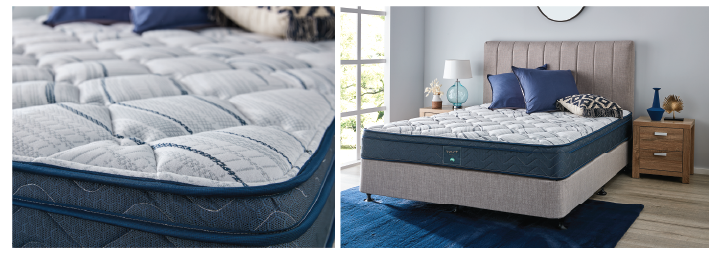Sign up to our newsletter and never miss out on the latest offers!
How Often Should You Change Your Bedroom Mattress?
The mattress journey can be a complex journey, and once you secure the perfect one it can be a daunting thought that in time, you’ll have to repeat it all over again. But how often should we be changing our mattress? It is generally recommended to change your mattress every 7 to 10 years.
Over time, a mattress can lose its support and comfort, leading to poor sleep quality and potentially causing discomfort or pain. The lifespan of a mattress can depend on several factors, including the quality of the mattress, how often it’s used, and how well it’s maintained. If you start to notice sagging, lumps, or other signs of wear and tear on your mattress, it may be time to consider replacing it sooner than the recommended timeframe.
Additionally, if you’re experiencing persistent discomfort or pain while sleeping, it’s worth considering whether your mattress is the cause and whether it’s time for a new one.
Image Features: Escape Mattress Collection
Factors that an affect the lifespan of your mattress are:
1. Quality: A higher quality mattress is likely to last longer than a lower quality one. Look for a mattress made with durable and high-quality materials.
2. Usage: The more frequently you use your mattress, the more quickly it may wear out. If you sleep on your mattress every night, it may need to be replaced sooner than if it’s only used occasionally.
3. Maintenance: Proper care and maintenance can help prolong the life of your mattress. This includes regularly rotating the mattress, using a mattress protector, and cleaning it as needed.
4. Body weight: The weight of the person sleeping on the mattress can affect its lifespan. A heavier person may put more stress on the mattress, leading to more wear and tear over time.
5. Environmental factors: Humidity, temperature, and exposure to sunlight can all potentially affect the lifespan of your mattress.
6. Type of mattress: Different types of mattresses have different lifespans. For example, a memory foam mattress may last longer than an innerspring one.
7. Sleep position: Your sleeping position can also affect the lifespan of your mattress. If you tend to sleep in the same position night after night, this can cause uneven wear on the mattress and lead to premature deterioration.
To help prolong the lifespan of your mattress, it’s important to store it in a dry, cool, and well-ventilated area, away from direct sunlight. You can also use a mattress protector to help protect it from spills, stains, and other damage.
Image Features: Zest Mattress Collection
To help you find your perfect mattress, we’ve put together a Mattress Quiz. Click here to find your match!






